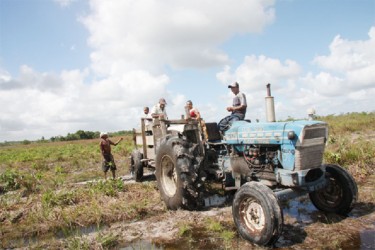Laluni is a microcosm of many farming communities along the Soesdyke/Linden Highway, where farming has been done for almost four decades by groups of migrants from various parts of the country who went there seeking betterment by transforming idle, arable lands into key centres of agricultural production.
That has not been accomplished. Some of the originally inhabited lands have been abandoned and there are limits to what those who have remained behind have achieved. The survivors insist that their real accomplishment reposes in the fact that they have endured.
The more than 500 people who have made Laluni home are a hardy breed. Over time, they have developed a keen sense of their common interest. Much of what they plant is fruit, mostly cherry and passion fruit, and cash crops. These days, the demand for fresh fruit juice and drink means that fruits are marketable items. Cash crops, of course are part of the local diet.

At Laluni, there appears to be no sense of strong ties to a central economy. The infrastructure that is necessary to sustain those ties is unreliable.
The road to the farmlands is an unending stream of the biggest potholes imaginable. It is patently obvious that it hasn’t been fixed in years. It is, however, only one of a host of obstacles to the realisation of the community’s goals. Here, you don’t thrive; you survive – by pure perseverance.
But perseverance cannot always be expected to trump underdevelopment and it is pointless to aspire unless you can find a way around the trail that takes your farm produce out to Kuru Kururu then to the Farmers’ Market at Stabroek, Those farmers who own vehicles possess mostly four-wheel-drive trucks and Canters. The terrain has taken its toll on some of them.
The farms reflect potential that is stifled by constraints. Everywhere, there is evidence of underachievement. An acute shortage of labour and the state of the access road has meant that ripened crops lie idle on farms. They will rot eventually. One of the farmers has invested in pigs only because the rotting fruits and vegetables provide a significant stock of feed.
Among the farmers the current gripe is about the price of peppers. There is a glut of peppers at Laluni and a farmer named Ravi says that the price has dipped from $60 a pint just a few months ago to $20 a pint. He says the farmers here produce thousands of pounds of pepper weekly. Interestingly, peppers are currently being retailed at $100 per pint.
The farmers at Laluni say their problems can be solved through official intervention. An all-weather farm to market road would serve as an incentive to increase cultivation. And as far as peppers are concerned, they are seeking the support of government, perhaps to acquire milling and bottling facilities and to access both local and overseas markets for pepper sauce. At the moment they are looking to “a businessman from Mahdia” who has promised to purchase the entire crop.
Spoilage, waste and loss of earnings are the occupational hazards of farming at Laluni. Ravi says that a few weeks ago about $600,000 worth of pumpkins were left to rot. Wholesalers from Georgetown had promised to buy the pumpkins but never turned up. It appears that they were
simply discouraged by the state of the road.
That is a common occurrence and there is simply no way around it, save rebuilding the road. The residents say there has been no shortage of ministerial promises in that regard. Current Minister in the Ministry of Agriculture Ali Baksh is the most recent official to make such a promise.
A spirit of community has emerged from the difficult circumstances. One farmer who owns a tractor and trailer has left the running of the farm to his son. He spends much of the day placing his vehicle at the disposal of the community; transporting children to school and doing other errands. The farmers say they are on the verge of establishing a group to lobby government about their difficulties. The government can do much worse than reach out to them before they undertake another arduous trip into the capital.





